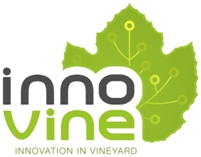InnoVine

Combining innovation in vineyard management and genetic diversity for a sustainable European viticolture
InnoVine is a European collaborative project funded through the Knowledge Based Bio-Economy (KBBE) program, launched in January 2013. During 4 years, it will involve 27 different partners from 7 European countries (Bulgaria, France, Germany, Hungary, Italy, Portugal and Spain).
The wine industry is a major economic sector through the European Union where wine production represented in 2010/2011 about 60% of the whole amount elaborated on the planet. Nowadays, European wine producers must face several key issues and challenges. Within few years, climate change will affect the balance between the area of production and grape varieties and will change the impact of pests and diseases in vineyards. Winegrowers will have to respect the environment while competing with other new producing countries on a more and more globalized market.
In this context, the strategic goal of the InnoVine project is to support the European wine industry by matching consumers’ demands for top quality wines and food safety, citizen’s requests for eco-friendly production methods and winegrowers technical needs in a climate change background.
The project will:
- At the plant level, improve and design agricultural practices (canopy management, irrigation, fertilization, training systems, pest and disease control…) with the aim of maximizing berry quality, durable resistance to pests and diseases, and adaptation to climate change.
- At the vineyard level, design, develop and test innovative agronomic systems integrating new agricultural practices and taking into account the variability of constraints met by European vineyards grown under a wide range of environments.
- At the breeding level, diversify grapevine varieties with regard to desirable adaptive traits building on tools and knowledge developed through international breeding genomic initiatives.
InnoVine is structured around 7 different parts or work packages (WP):
- WP1: Effects of vineyards practices and environment on grapevine and berry in relation with climate change.
- WP2: Designing optimized vineyard practices to reduce pesticides.
- WP3: Exploiting the genetic diversity in grapevine.
- WP4: Conception and test of sustainable viticulture practices or systems.
- WP5: Implementation of decision support systems towards a sustainable viticulture.
- WP6: Dissemination and technology transfer.
- WP7: Consortium coordination and project management.
>> web site
Department of Sustainable Crop Production (DI.PRO.VE.S.)
- Department
- Sections
- Education
- Research
- Projects
- Baby Food Rice: a market to claw back
- BIOVINE
- Frumento Bietola Ecosostenibile
- GENBACCA
- IDRA
- InnoVine
- LIFE AGRESTIC
- LIFE+ SOIL4WINE
- Guidelines to prevent and control the fusarium of white garlic fusarium
- MICOntrollo
- MYCHIF
- MycoKey
- NutriVigna
- PROTEUS
- PRO-VITERRE
- PURE
- ValorInVitis
- VinCapTer
- VineMan.org
- VITISUST
- W2FLY2FEED
- Laboratories
- Research Centres
- Events
- Contacts
